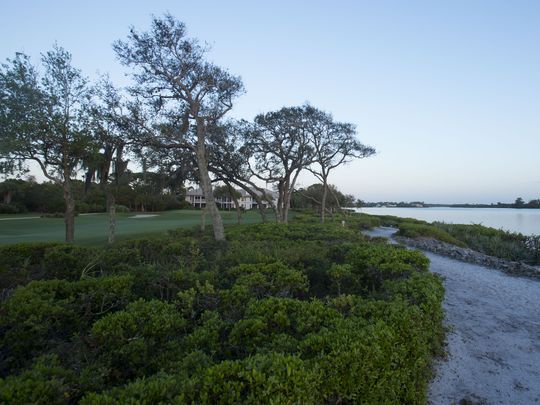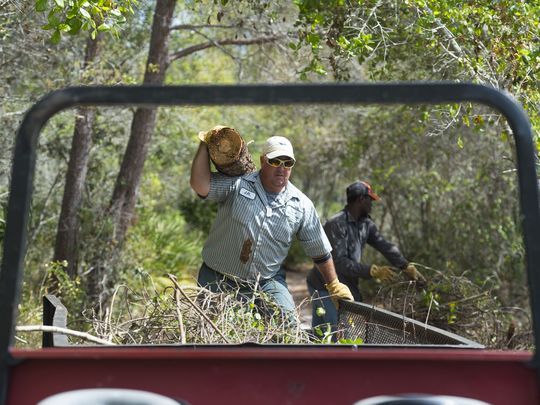Golfers at Harbour Ridge Yacht & Country Club have more incentive than most to “keep it in the fairways.”
Some of the holes at the course in St. Lucie County north of Palm City are bordered by wetlands, and folks at Harbour Ridge take protecting their wetlands very seriously.
“You stay out of the wetlands, even if your ball goes in there,” said Tim Cann, director of greens and ground maintenance at the club. “You take a drop instead. And the worst thing a golfer wants is another stroke on his scorecard.”
As one of eight Treasure Coast golf courses certified by Audubon International’s Cooperative Sanctuary Program, Harbour Ridge cares about more than wetlands.
To be certified, a course has to meet strict standards in wildlife and habitat management, pest control, water conservation and water quality.
Despite news in early February that construction of a golf club partially owned by basketball legend Michael Jordan near Hobe Sound was polluting the South Fork of the St. Lucie River, courses generally are good environmental stewards, said Edie Widder, lead scientist and founder of the Ocean Research & Conservation Association in Fort Pierce.
ORCA developed a map showing “hot spots” of nutrients flowing into the Indian River Lagoon around Vero Beach. The areas around two Audubon-certified courses — Vero Beach Country Club and The Moorings Yacht & Country Club — are surprisingly “cool.”
“Yeah, we were pretty surprised, given that we assumed golf courses use a lot of fertilizer,” Widder said.

As part of the guidelines to be certified in Audubon International’s Cooperative Sanctuary Program, all property and golf courses sit at least 75 feet away from the St. Lucie River. Harbour Ridge Yacht & Country Club in St. Lucie County has been certified with Audubon’s program since 2000, at the time just the 31st golf course to gain that certification in Florida. (Photo: LEAH VOSS/TCPALM)
Spoon feeding’
Turns out over-fertilizing isn’t just bad for the environment, it’s bad for golf courses, said Craig Weyandt, course superintendent at The Moorings.
“The role of a golf course superintendent is to maintain the turf and to keep it healthy, not to grow grass,” he said. “Feed turfgrass too much nitrogen, for example, and it depletes the carbohydrate reserves in the plant. It would be like a doctor making a patient sick.”
Over-fertilizing also forces a plant to grow, which to a golf course looking to stay both green and in the black means more mowing, more work and wasting more fuel.
Cann refers to it as “spoon feeding” nutrients.
“Before we use any fertilizer we test our soil to see what it needs,” he said. “Most homeowners don’t do that. They run out to Home Depot or Lowe’s and buy fertilizer that their soil may not need. By testing our soil, it’s very uncommon for us to put any phosphorus out. We just don’t need it.”
Pesticides at Audubon-certified golf courses are “spoon fed,” as well.
“Yes, golf courses use pesticides, the same way you take medicine when you get a cold or flu,” Weyandt said. “The difference is that today’s pesticides are host specific, meaning that there is not one pill to cure all ailments.”
Problems are treated on a spot-by-spot basis, he added, “not acre-by-acre.”
The first line of defense against pests at Harbour Ridge is “biological,” Cann said: good critters that eat bad critters.
When pesticides are used, they’re spot-treated using battery-operated tanks instead of broadcast sprayers. And they’re never used within 25 feet of lakes or wetlands.
Water hazards
When fairways and greens are lush in the middle of South Florida’s dry season, you know they’re using a lot of water.
But not as much as you might think, Cann said.
“Our water use has been diminished significantly over the past few years by technology,” he said.
The course has a computer-run irrigation system to prevent over-watering and switches that automatically shut down sprinklers when it rains.
“The automatic shutoff when it rains may be the biggest water saver,” Cann said. “The worst thing for me to see is the water running when it’s raining.”
The primary source for irrigation at Harbour Ridge is treated wastewater generated throughout the property. As a secondary source, Harbour Ridge has an agreement with the South Florida Water Management District to draw water out of the nearby C-23 Canal.
It’s a mutually beneficial relationship: The canal drains farmland in western Martin and St. Lucie counties, so it’s laden with nutrients and pollutants that, if not diverted to Harbour Ridge, would end up in the St. Lucie River.
Besides being used for irrigation, the canal water diverted to Harbour Ridge is sent to lakes and wetlands. Filtered by turf and nutrient-hungry aquatic plants, any water that leaves the property is cleaned before it enters the river.
Going natural
A lake tucked away from the Harbour Ridge golf course is home to a rookery for several species of birds, including cormorants, anhingas and egrets. Clumps of algae can be seen in the lake shallows, but Cann doesn’t rush to grab a bunch of chemicals to get rid of the green goo.
“Here, the algae is a part of the natural system,” he said.
If the algae was to get out of hand and threaten to take over the lake, Cann and his staff might install “bubblers” to aerate the water and cut back the algae naturally.
Most water hazards on the course and lakes throughout the community are lined with native plants such as pickerel weed to help suck up any nutrients that might run off the ground and keep the water clean.
“Good golf courses don’t poison their ponds,” Widder said. “They keep them clean naturally.”

Robert Coleman, an operator at Harbour Ridge Yacht & Country Club, helps clear out invasive plants, including Brazilian pepper and grapevine, on Tuesday at the community north of Palm City in St. Lucie County. The removal of exotic invasive plant species is one of several projects Harbour Ridge maintains in order to keep their status with Audubon International’s Cooperative Sanctuary Program for golf courses. (Photo: LEAH VOSS/TCPALM)
Member buy-in
Most golf courses, even if they’re not Audubon-certified, are good stewards of the environment, said Ed Skvarch, St. Lucie County Extension Service director and commercial horticulture agent who teaches best management classes to golf course superintendents and other workers.
“In class we talk about how you don’t just throw pesticide at a bug problem and how you keep fertilizer out of the water,” Skvarch said. “I think most people take what they learn in the class and use it. Of course, some take the class just to get certified.”
Club members have to be educated about environment-friendly golf courses, too, Widder said, and not freak out at a patch of brown grass on a fairway.
“Let the people trained to maintain your golf course do their job the way they were trained,” Widder said. “You’ll get a better golf course, and we’ll all get a better lagoon.”
Audubon-approved
Eight Treasure Coast golf courses are certified by the Audubon Cooperative Sanctuary Program for Golf Courses, which helps to enhance wildlife habitats and protect natural resources:
- Floridian National Golf Club, Palm City
- Harbour Ridge Yacht & Country Club, Palm City
- Hawk’s Nest Golf Club (The Moorings), Vero Beach
- Loblolly Golf Club, Hobe Sound
- The Moorings Yacht & Country Club, Vero Beach
- Orchid Island Golf & Beach Club, Orchid
- Sandridge Golf Club, Vero Beach
- Vero Beach Country Club, Vero Beach
Published By: TCPalm.com Tyler Treadway
As a golfer in South Florida, you won’t find 36 better reasons to fall in love with the game all over again than on Harbour Ridge Country Club’s championship golf courses.
Widely touted as two of the best golf courses in South Florida, River Ridge, designed by the father and son team of Pete and P.B. Dye and Golden Marsh, designed by Joe Lee, are beautifully crafted into the pure landscape along the banks of the river and a 20-acre nature preserve. Complemented by breath-taking scenery and spectacular views, each course provides a uniquely different playing experience that delivers a challenge yet remains manageable for all handicap levels to enjoy.
Renowned for our environmental preservation, Harbour Ridge offers access within the gated golf community to two of the most pristine golf courses on Florida’s Treasure Coast: The River Ridge and Golden Marsh.
The father and son team of Pete and P.B. Dye designed River Ridge with an eye toward beauty as well as “playability.” Situated among vast wetlands, it’s considered to be one of the top golf courses within Florida’s golf communities.
Golden Marsh lies amidst a 20-acre nature preserve. This Joe Lee inspired golf course, again, is recognized as one of the finest golf course communities on the Treasure Coast. Enjoy the soft sounds and smells of natural beauty as you play your way through some of Florida’s most arresting natural habitat.
Single digit handicappers will feel welcome in this Florida golf community near Stuart in Palm City, Florida. For those looking to improve their skill level, Harbour Ridge has the answer for that too!
Harbour Ridge members enjoy full access to renowned golf training and learning programs geared for beginners to Tour Professionals. Our Teaching Professionals use the most advanced equipment and analysis software available from TrackMan to V1 Interactive Frontiers to evaluate each students’ swing and ensure proper club fitting.
Members are able to arrange a wide variety of instructional opportunities with the Professional Teaching Staff such as:
• Private Lessons
• Weekly Group Clinics
• Full Swing Schools
• Short Game Schools
• On course Playing Lessons
• Game Evaluations
• TPI Body Assessment
• Mental Golf Profile Testing
• Club Fittings
• Educational Seminars
Located in the heart of Florida’s famed Treasure Coast on the north fork of the St. Lucie River, Harbour Ridge is a community where golfers and tennis players mingle with yachters and nature enthusiasts to create a buzzing, active community of residents. Nowhere else in Florida can prospective homebuyers find two championship golf courses, spacious marinas and beautiful homes just mere feet from the wide water.
After you add up the award-winning golf, unmatchable access of the marinas and waterways, the stunning homes, the expansive lifestyle complex and clubhouse, Harbour Ridge checks off the entire list. Learn more and register for the Harbour Ridge Digital Brochure today!



